Day 22 – VIDEO – Iftar – Sultan, Abdullah, Abdur Rahman – Abu Huraira Center
Comments Off on VIDEO: Day 22 – Iftar – Sultan, Abdullah, Abdur Rahman – Abu Huraira Center
Share it:
Comments Off on 30Mosques.com | VIDEO: Day 20: Fireworks in a Parking Lot
By Aman Ali
My sincere apologies to the kid I almost shot in the face with these fireworks, lol.
Category:
Share it:
Comments Off on VIDEO: Day 21 – Madinah Masjid – 1015 Danforth Avenue
Category:
Tagged with:
Share it:
Comments Off on 30Mosques.com | Day 20: The MSA Experience
Category:
Tagged with:
Share it:
Comments Off on 30Mosques.com | VIDEO: Day 17 – Moments from Atlanta
By Bassam Tariq
Moments from the West End Mosque.
Visit 30mosques.com for more information.
Category:
Share it:
Comments Off on 30Mosques.com | Live Chat: Round 2!
Reminder: Live video chat at 11PM EST. Visit 30mosques.com for the feed. We might also be doing fireworks show for you all #30mosques
— Bassam Tariq (@curry_crayola) August 20, 2011
By Bassam Tariq
Thanks for joining our second live chat, over 300 people attended! If you missed it, click the “More” button below to catch it. Look forward to our next one at the end of the trip!

Powered by: CoveritLive
Category:
Tagged with:
Share it:
Comments Off on 30Mosques.com | Day 19: Allah Gave Us Honor
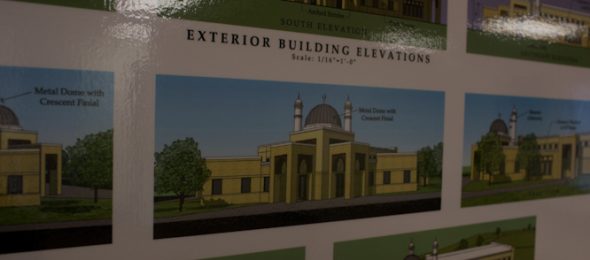
By Aman Ali
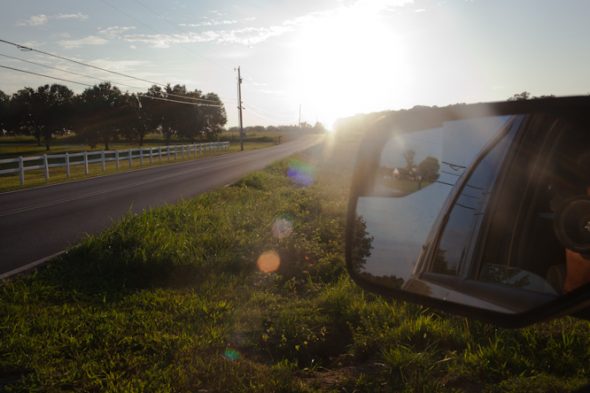
Welcome to Murfreesboro, Tennessee. You may have read about it or seen the CNN documentary about how a fringe group of local residents are trying to derail plans for building a mosque here. The construction site for the mosque has even been subject to arson and vandalism.
I was more interested though in finding out what was happening behind the scenes for the Muslims here. What’s it like to go from living in a small town in Tennessee to getting microphones and news cameras shoved in your face day in and day out?
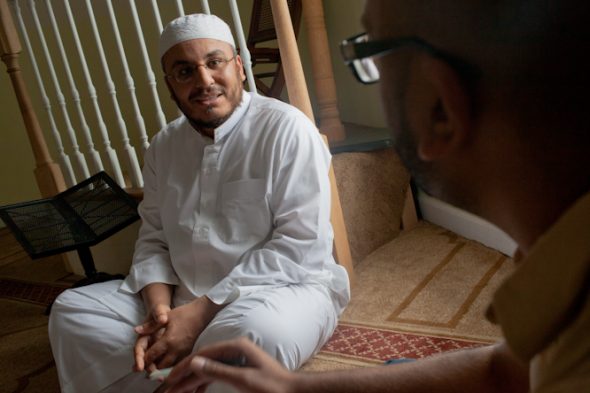
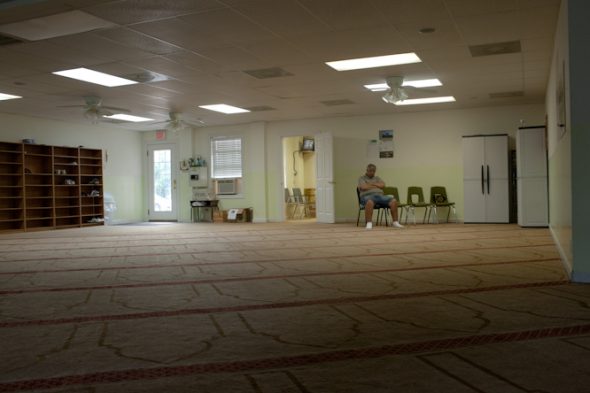
I met the mosque’s imam, Sheikh Ossama Bahloul, in his office to chat about the whole ordeal. He speaks with a dense Egyptian accent pronouncing words like “the” as “ze” or any word with the letter “P” in it as “B.” But he cuts through the language barrier with his intellect. He said he’s well aware the opposition against the mosque isn’t necessarily an anti-Islam movement, but rather politicians stoking flames of fear to score some political points.
“They use the Muslim community in specific areas of the country as a tool in their hand to make specific achievements,” he said. “This is a strategy because of the White House election coming. 27 bercent of the American people believe the president is a Muslim, still! It’s craziness, yaani.”
When the controversy first erupted last year in Murfreesboro, Sheikh Ossama said nobody in the Muslim community anticipated how many news networks would come flooding in.
“The issue became too big,” he said. “The Jabanese TV, France TV, Australia TV came here. What is this, for what? In a way it’s ridiculous.”
I asked him if he did any interviews with Fox News.
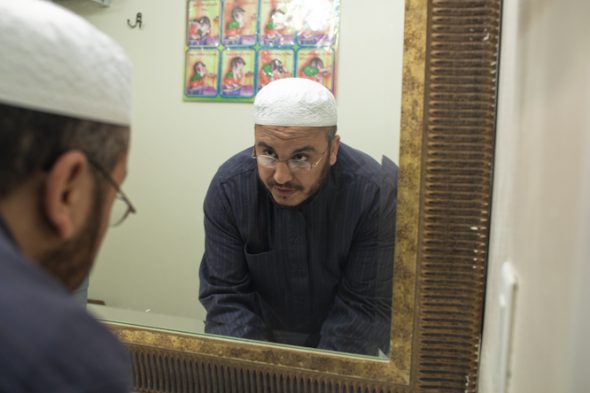
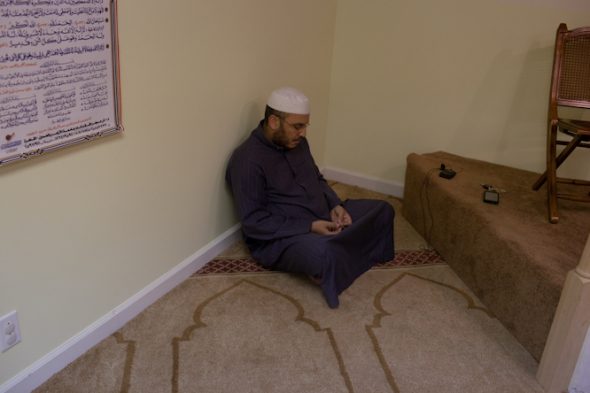
“No,” he said before wagging his finger. “Audhu billahi minashaytan nirrajeem (Arabic for ‘Allah, I seek refuge and your protection from the devil’).”
The sheikh had me cracking up constantly with deadpan wisecracks like this throughout the entire interview. Hang out with him long enough and you’ll find out how much of an endearing goofball he is. A photographer was there that day asking us to pose seriously for the camera and I had to keep asking the sheikh to stop making Bassam and I laugh.
“Now this guy, he is looking scary,” Sheikh Ossama said while pointing to Bassam, who was sporting his Blue Steel pose for the camera. “Why you so scary? Don’t do that, I can get scared very easily.”
Sheikh Ossama said he mostly stuck doing interviews for CNN and the BBC. He chose not to do any interview with Al-Jazeera or similar Middle Eastern networks.
“We decided not to go to Al Jazeera or any of the Arabic channels because they would make it a big deal and make America look ugly,” he said. “It’s good to care about the country. American people are nice people. It’s not fair to say they are bad. I don’t want anyone to hate anyone. We must push for love and peaceful activity.”
This isn’t my first time meeting the sheikh. In September 2010, ABC News invited him and I along with a bunch of other people to participate in a Town Hall special on Islam. I chose not to say anything during the special because it turned into a theatrical shoutfest. If you saw the special, you saw the imam constantly trying to jump in and respond to all the ignorant things said during the taping. He told me early on, he often got heated in media tapings like these because it was tough to not respond to all the ignorance he was hearing.
“I couldn’t take it well in the beginning,” he said. “It was difficult for people to call me and give our Prophet Muhammad (peace be upon him) a bad name. It was tough to hear people say we can’t have a Muslim cemetery here in Murfreesboro because it will contaminate the water.”
But soon, he and other people in the community’s irritation to all the ignorance faded.
“People can be angry, but I intend to look at it from this perspective: I believe strongly that Allah chooses people for specific jobs. I believe that Allah chose us for this specific challenge. So in a way I felt Allah gave us an honor to deal with this challenge.”
“When people gave us fake allegations and lies, we were so comfortable because I don’t think it’s proper to make enemies because our life is too short and it’s not worth it. I might get mad here and there, but it’s not a big bercentage at the time because it’s not worth it.”
The Muslims here pray inside an office space inside a shopping center as they prepare to break ground on their mosque project in the coming weeks. I broke my fast in the evening alongside Salim Sbenaty. He’s 14 years old and I remember seeing him on CBS News last year about how he was actively standing up for the mosque and engaging the opposition.
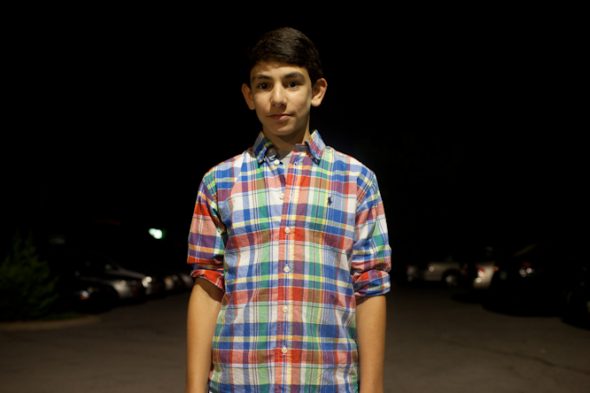
“I’m huge on human rights,” he said. “That’s mainly what inspired me. It’s not more of my own religion that inspired me. If it was any religion, I’d act upon it because everyone deserves these rights.”
“Now how many times have you said that soundbyte in front of a camera?” I teased him.
Like me, Salim has done his own fair share of media interviews so we started riffing about all the silly questions reporters often ask us.
I get the question ‘How do you feeeeeel?????’ about a million times, he said. “Get it from the last guy, do you really have to ask me?”
But he doesn’t get annoyed by it, he added.
“I know that these questions may bring somebody towards better understanding what’s happening,” he said. “Even if I’ve said something over and over and over, it’s for another person that may have not heard it before.
He said he wasn’t prepared to handle all the media attention initially but there was a particular interview where he realized how big this whole Murfreesboro controversy really was.
“I think it was the one I did for Nickelodeon,” he said. “It was that interview when I realized, ‘Wow this is actually an international issue – Murfreesboro, Tennessee.’”
“Wow, Nickelodeon. You were interviewed by CBS News but the network that created Spongebob Squarepants, that’s what did it for you?” I riffed back.
When you’re doing so many interviews encouraging people to better understand Muslims, it’s easy initially to become infatuated with the aura of being on television. I asked him what he does to curb that.
“I try to remind myself that this is my civil duty,” he said. “It’s nothing special. I’m doing this for Allah and only Allah. This isn’t a priviledge or something that I chose to do. It’s my duty of sort.”
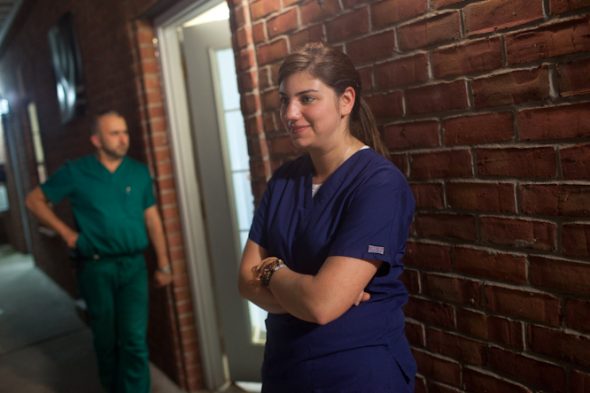
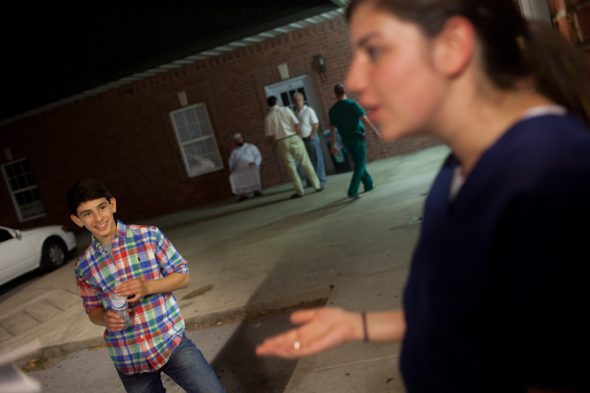
Now the “celebrity” in this community I wanted to meet was his older sister, Lema Sbenaty. She was on the CNN special and there’s footage of her grilling this lady running for office bashing the mosque project. Before coming here, I was in touch with her via Facebook where she kept calling me “Mr. Ali,” making me feel like I’m 26 going on 65. I was told she was outside, so I laced up my Puma sneakers and stepped out of the mosque to find her.
“Are you Mr. Ali?” she said pointing to me.
“Dude, I told you not to call me that!” I said. “Makin me feel like an old fart, jeez.”
“Well I dunno, I just saw the bald head and figured it was you,” she quipped.
After seeing her on CNN and learning about her courageous story, I had some burning questions for her.
“The most important question I have for you is, after the documentary aired… how many random people messaged you on Facebook with marriage proposals?” I asked.
She said she’s gotten more than 20! That’s almost twice what I’m getting.
“One guy from Tunisia said ‘I saw your interview and would like to meet your family,’” Lema replied while laughing incredulously. “I was on TV for 25 seconds. Who watches something that makes them want to go on the computer and send a proposal?”
She also gets several messages and emails from Muslim women thanking her what she’s doing. The challenge for Lema was learning to embrace the unwanted role of being a female Muslim role model.
“I don’t want to represent Islam in a bad way,” she said. “It was a big struggle, this whole idea of ‘Am I going to be good enough for these girls to look up to me?’ After the CNN interview, the sheikh came up to me and said ‘You have to pay attention to yourself now because people know who you are. So it’s good in some ways because you remain grounded and in check.”
A fringe but vocal group of people are pumping thousands of dollars into stopping this mosque from being built. As a result, the Muslims become victims of these people’s selfish attempts to exploit them for political gain. But I’m taken back by the relentless strength this community has. I asked the imam where their perseverance comes from.
“It’s good for the human being to recognize the limits in his or her ability,” he said. “I realize this situation is in Allah’s hands. I sometimes say ‘God, I don’t know much and I don’t know how to handle this, please help me’ and God will give you the help you need. If you are arrogant and say you can handle this on your own, you will not do as good.”
“Sometimes what people say can make me angry,” he added. “I’m not an angel. When I hear children in school being called terrorists and little girls coming to me saying they’re too scared to wear the headscarf, it hurts me and makes me angry. But it’s only for a few minutes. Allah chooses people to deal with specific challenges so we are grateful.”
Category:
Share it:
Comments Off on VIDEO: Day 20 – ISNA Islamic Centre of Canada – 2200 South Sheridan Way, Mississauga
Category:
Share it:
 By Jasmine Amoh (@amajas)
By Jasmine Amoh (@amajas)
For the past ten years or so, I’ve driven past this Masjid, always telling myself that Insha’Allah, one day, I’ll make it here for Jumu’ah.
Problem was, I never saw any sisters entering, so I decided to call up this morning and inquire whether there was a separate entrance for sisters, and if the khutbah would be in English.
“Oh yes sister, there is a separate entrance, and yes, the khutbah will be in English, not to worry!” said the bubbly brother on the line.
Of course I was delighted to hear this, so I prepared to head up the street on my lunch hour for Jumu’ah.
Category:
Tagged with:
Share it:
Comments Off on 30Mosques.com | Day 18: Migrating For Love
By Bassam Tariq
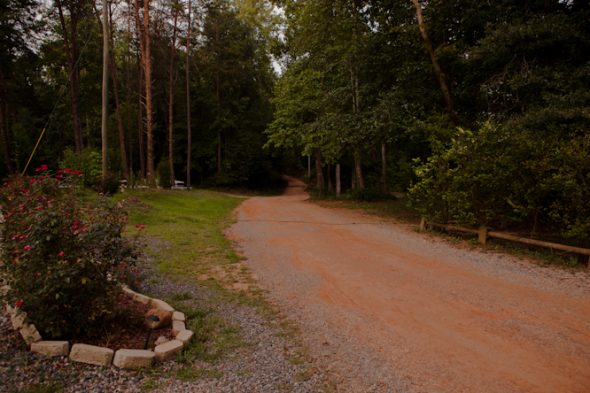
The entrance to Islamville.
Passed the confederate flags and horse ranches, a little entry way down a broken road leads to a small mobile home community. I drive slowly down the road and see three to four mobile homes lined up next to one another. A large African American man comes out wearing a shalwar kameez, a traditional South Asian garb, and greets us. He is the elder in the community and goes by Uncle Ali.
“We here are completely transparent. You can ask us anything.” Says Uncle Ali. “I fought with the mujahideen’s not in 1980, but in 1981. So get what we say right.”
Welcome to Holy Islamville.
The majority of the congregation is African American. Instead of saying “yes” or “okay” many of them reply saying, “acha” or “jee” the Urdu way of saying it.
The entire community has been inspired by Sheikh Mubarak Ali Gilani, who they call “abu” (father in Urdu) or “Shah-sahib.”
Sheikh Gilani was in the US in the early 1970’s and lived in Brooklyn. There, he began to connect with many of the African Americans.
“We knew there was something different about him,” says Abu Khalil, “he had a way to connect with us. We were drawn to him.”
In the early 1980’s, Sheikh Gilani led a very public “jihad campaign.” He encouraged many to go fight in Afghanistan against the Russians. He made his campaign public and sent out letters to the embassies, the US government, etc. No one seemed to pay attention.

Sheikh Mubarak Ali Gilani. (Islamberg site)
After the campaign fell through Sheikh Gilani became concerned about the environment his students were living in. So him and his students began to buy property all across America and many of them began settling in rural parts of America. It was their Sheikh’s way to purify them.
“Out here, we are closer to Allah.” Uncle Musa tells me.
Uncle Musa is our de facto tour guide who shows us around the property. He brings us to the Holy Shrine where many students have seen the word “Allah” appear in light many times through. There is a fax machine on a pedestal because of a jammed paper miracle that occurred with it. The Sheikh directed his students to make the place a full-time shrine open for anyone to visit.
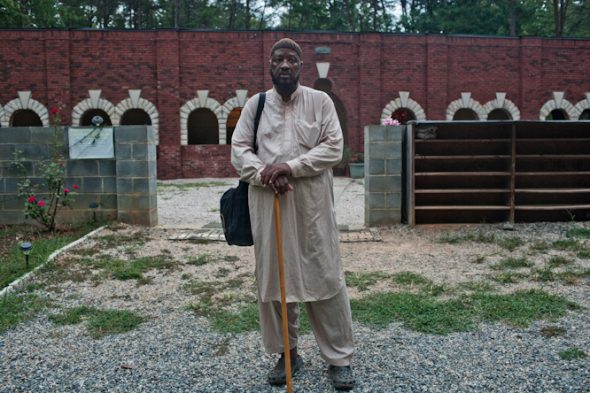
Uncle Musa stands outside of the Holy Shrine of Islamville.
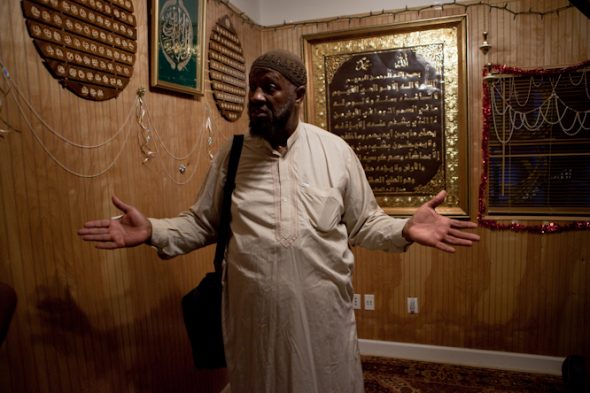
Uncle Musa shows some of the Islamic artwork done by the community
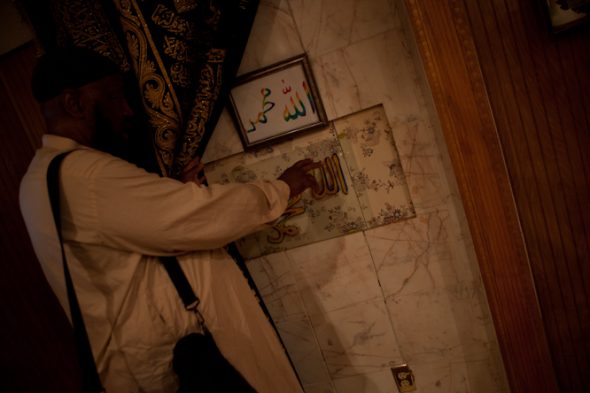
Uncle Musa points to one of the miracles seen by one of the women in the community.
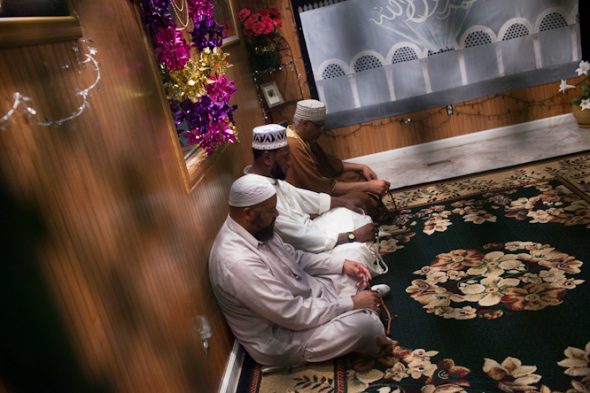
People do a silent dhikr, remembrance of God prayer, session inside the Holy Shrine.
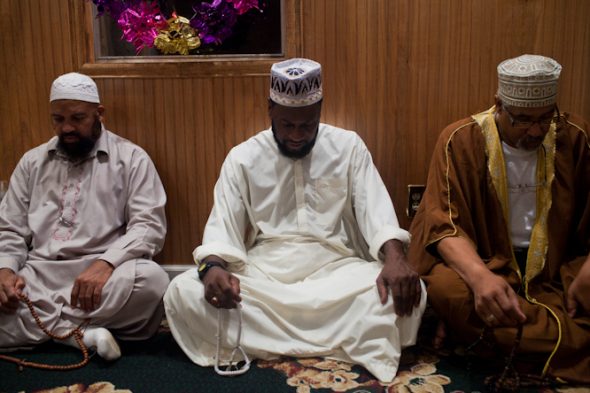
Silence.
Islamville opened in 1983 in a small rural corner in South Carolina. At the time, only five families migrated there. Now, there are about 20 families that live in the surrounding areas. The community tries to be as self-sufficient as they can. Some of the men raise goats and chicken, others educate the kids in the makeshift school and some have gone to Pakistan to learn the religion and live out on the farm. Instead of going to high school, the kids get their GEDs . College is encouraged. Many of them go to technical school, others become nurses and doctors. The community may keep the kids close in the beginning, but they encourage them to step out for working opportunities.
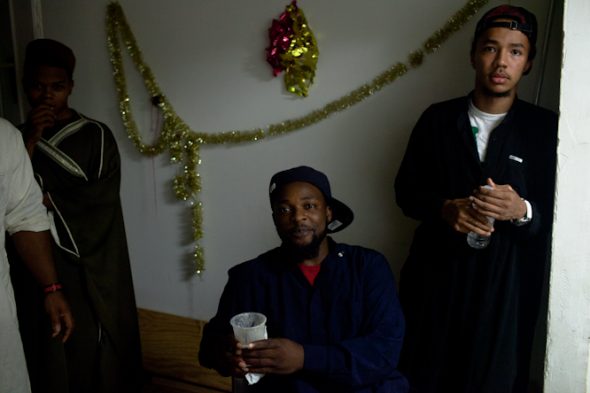
The young guys that have grown up and live around Islamville.
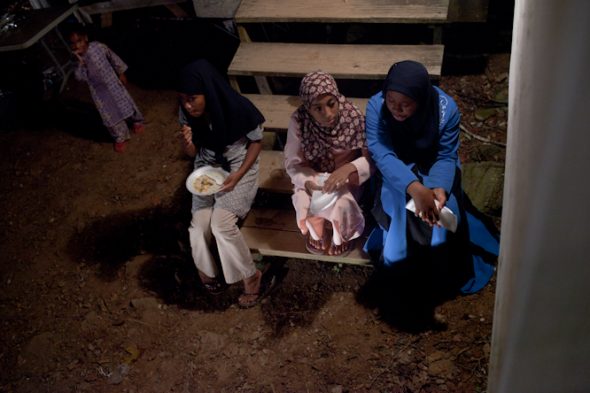
The girls from the community.
For break fast, we were served samosas, a traditional south Asian potato patty and then we had meat and potatoes for dinner.
“Ah aalu gosht!” I say in urdu.
“oh brother, you know what this is?” One of the community members says.
“Yeah, I am from Pakistan. This is food from the motherland.”
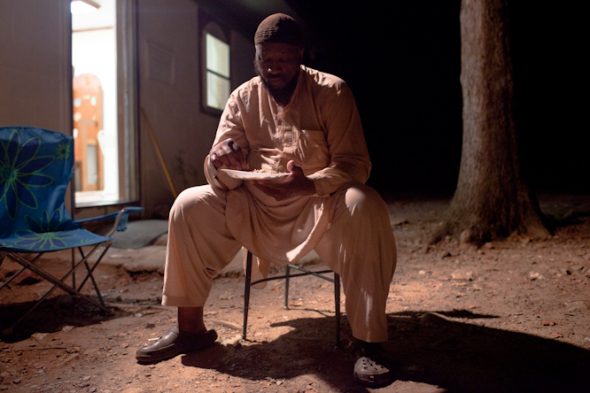
Uncle Musa chows down on potato and meat (aalu gosht).
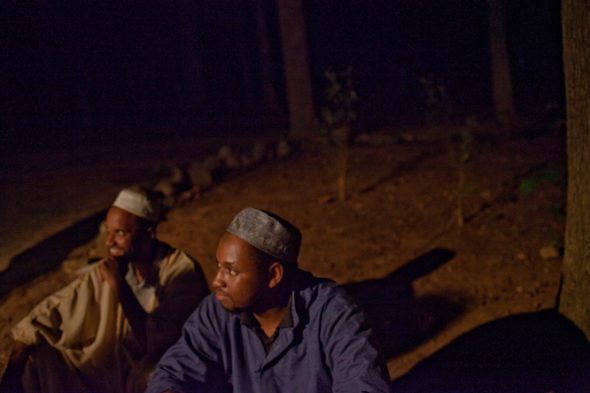
Uncle Musa’s son, right, sits with a friend as they hear a story from an elder in the community.
It’s hard not to notice the South Asian tendencies of the congregation. From the subtle hand gestures to the decorations in the mosque, I am reminded of the strong South Asian influence seething the entire township. The easiest way to notice the Pakistani influence is by watching the community sing on YouTube.
The first time I heard of Islamville was from a YouTube channel I saw of their sister community, Islamberg. The Islamberg community lives out in Bimnington, New York and they have a collection of Islamic songs and spiritual chants for people to watch. The mannerisms and singing style are shockingly similar to that from South Asia. Many of them have added their own take to it, but one can’t deny the heavy Pakistani overtones in all this.
Note: They are singing in Urdu.
Shaikh Gilani has gotten a lot of scrutiny in the media. The death of Daniel Pearl, a wall Street Journal reporter in Pakistan, has been linked to Sheikh Gilani since Pearl was on his way to meet the sheikh.
It was difficult for me to find anything objective of him online. The entire community that he represents is under attack in America. Whether the small townships he helped establish are called jihad training camps or extremist retreats, the community seems to have a lot of enemies.
(I tried to get some photos of Sheikh Gilani from the congregation but many refused to share their personal photos with him. They all forwarded me to the internet. Throughout the community and the shrine, not a single photo of him was to be found.)
“We are very open here.” Uncle Musa tells me. “if anyone wants to come and visit us, we welcome them with open arms.”
It’s easy to get suspicious at the idea of Muslims living in large communities out in rural America. The fear that these people are training for Jihad against America or building an army against the country is real – and there are many people working day and night trying to get these communities closed.
But they are alive and thriving. The people here are not concerned about that. They are not concerned about the fact that many other African Americans would say that they are losing their black identity by adopting another lifestyle.
To the people in Islamville, the only thing that matters is God and their relationship with Him. It all comes back to that. They have left their lives, their jobs so they can come out of this town not to retire, but to build something new. And for being established since 1983, construction hasn’t gone that far. They are living in mobile homes, the school is only two rooms big and the roads are not paved.
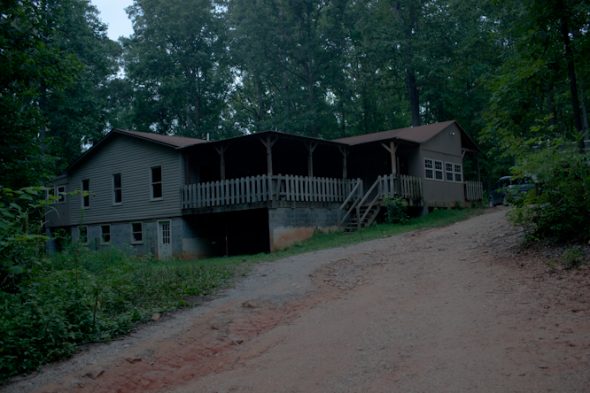
The school house.
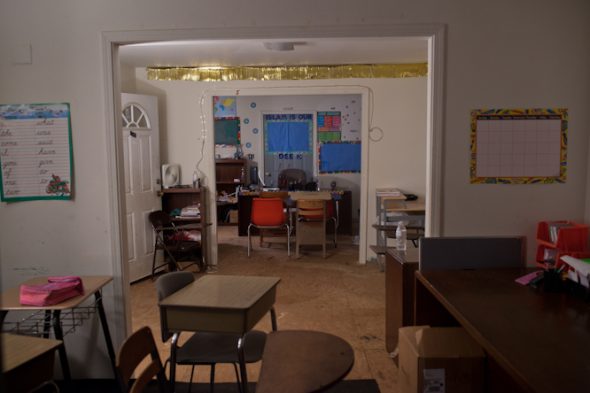
The two room school where many of the kids who live in and around Islamville attend.
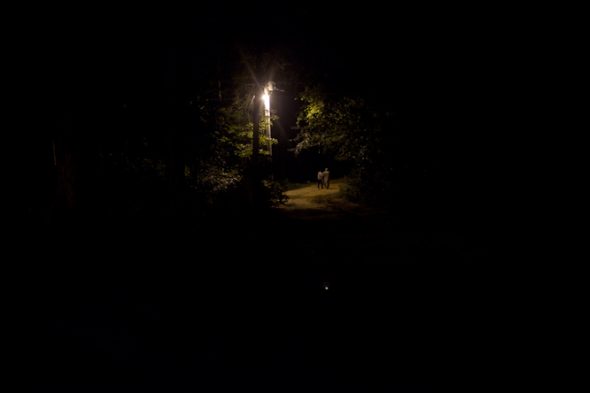
A dark walk back towards the car.
But there is love here. A love that must be acknowledge. They understand the transient nature of life and for them to be here – it is just a step to that which is greater than them. Your criticisms mean nothing to them. They are busy yearning for the Divine.
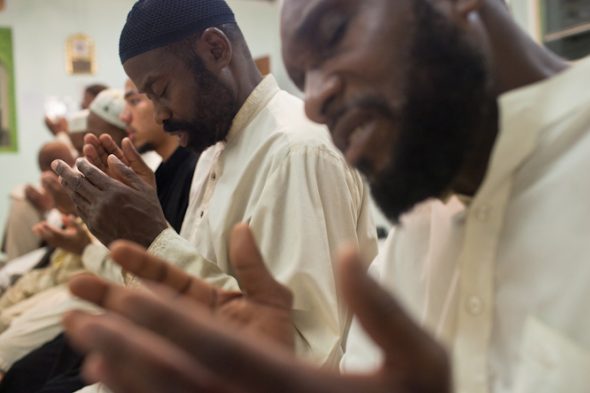
Category:
Tagged with:
Share it:
Comments Off on VIDEO: Day 19 – Islamic Shia Ithna Asheri Jamaat of Toronto – 9000 Bathurst Street, Thornhill
Category:
Tagged with:
Share it:
Comments Off on 30Mosques.com | Day 17: It’s Still Five A Day
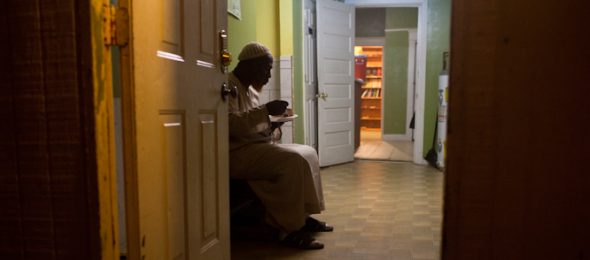
By Aman Ali
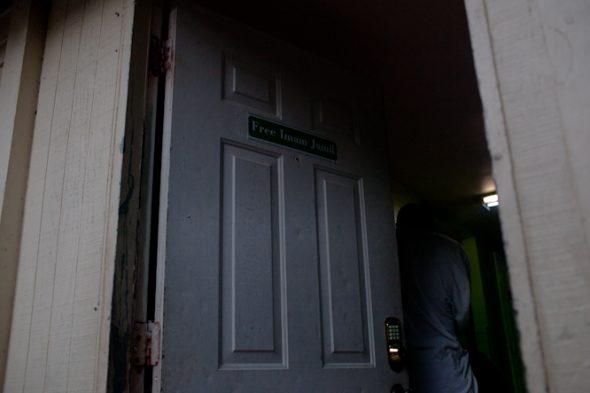
The backdoor of the mosque has a sticker that reads “Free Imam Jamil.”
It’s been over 11 years since Imam Jamil Al-Amin, known during the Civil Rights era as H. Rap Brown, was arrested for shooting two Atlanta officers.
His wife Karima of over 43 years spoke with me, folding her hands in her lap and opening up about how she deals with his controversial conviction.
“Well, it’s in Allah’s hands and we submit to that,” she said. “When you submit, you take anything and everything that comes your way. Nothing throws us.”
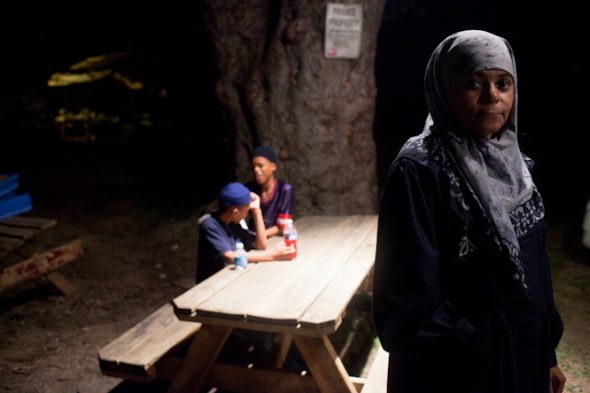
Karima Al-Amin stands outside of the mosque.
I first learned about Imam Jamil in high school through hip-hop. Public Enemy put out a track in 2002 where Chuck D says “Jamil Al-Amin, nah’ mean?” Well, a kid like me from a white Ohio suburb didn’t know what he meant, so I Googled the name. Before he was Muslim, Jamil Al-Amin was H. Rap Brown, a civil rights activist and chairman of the Student Nonviolent Coordinating Committee. He was controversial for his views on race and was often accused of inciting riots.
In the 1970s, he and his wife embraced Islam and established a mosque here in the West End of Atlanta. It was one of the first mosques in the area to hold the five daily prayers in Islam known as salat. Among many things, the mosque under Imam Jamil’s leadership cleaned up crime in the neighborhood and many convicted criminals abandoned their pasts and embraced Islam. On the national level, he tried to bring many national Muslim groups together.
“He always felt if we prayed together and fasted together, we could be a political force,” Karima said. “He never felt we were outnumbered, just outorganized.”
I asked the current imam of the mosque, Nadim Ali, what it was like to deal with Imam Jamil getting locked up.
“He trained us for this,” he said. “When he got incarcerated, he told us ‘It’s still five a day. It’s never been about me, still gotta pray five times a day and establish your salat.’”
(Side note: Imam Nadim Ali is an incredible singer and in the coming days we’ll be posting a video of a quick song he did with his fellow group mates.)
The following are photos from the mosque community that Imam Jamil help start.
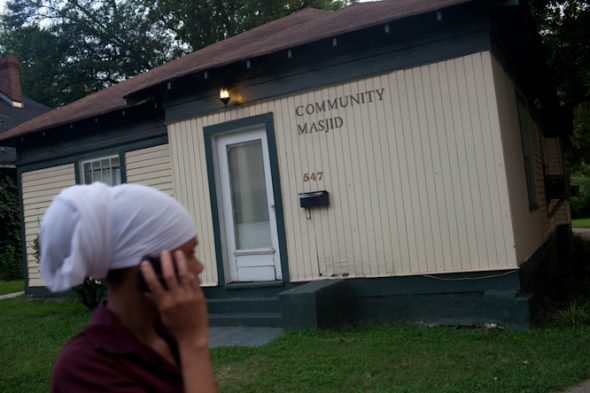

Taayeb watches his friends play Nintendo DS as he waits to break fast.
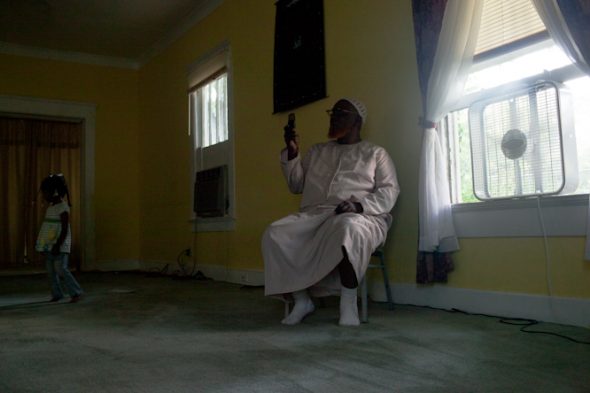
A congregant checks the time inside the mosque.
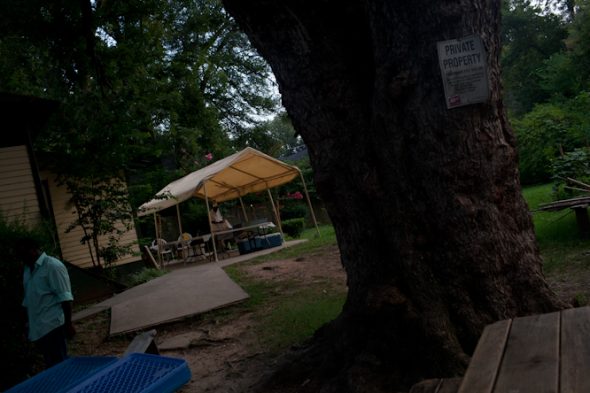
The back of the mosque. Congregants break fast under the tent.
You can read all about Imam Jamil here and about his controversial arrest and conviction here. It’s important for us to go beyond the headlines and explore his relationship with his wife and his spiritual impact on the people that know him.
Since the beginning, Karima said Imam Jamil has always been a political target. She said she never worried about his safety fielding death threats and getting arrested after speeches because it came with the territory of being a public figure at the time.
“We were young and on top of the world,” she said. “I never really thought in terms of something happening to him.”
She added she felt the same way when he was arrested in 2000. The family had just returned from a dinner at Red Lobster when Imam Jamil went to the mosque to lead prayer and check up on a local Islamic goods store nearby. Moments later, Karima, who is also a practicing attorney, learned he was arrested.
“The story about how he was arrested is fuzzy,” she said. “The main thing is he maintains his innocence and he was not the person who did those crimes.”
I told Karima I’m sure dealing with the arrest ever since has been a rocky journey of emotional ups and downs for her.
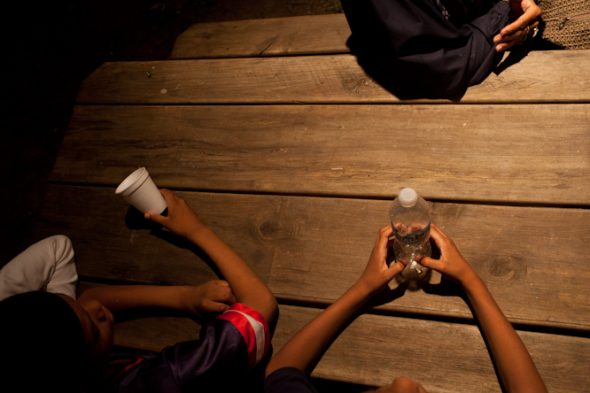
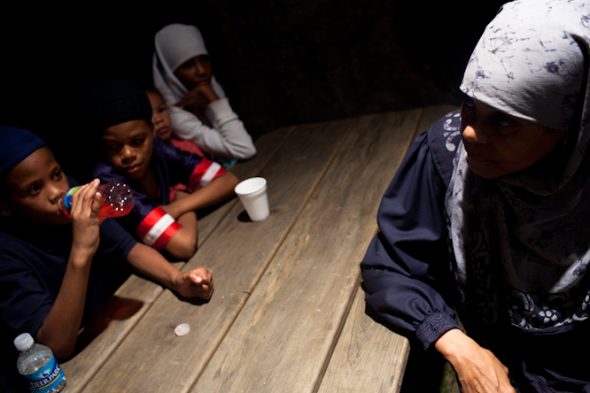
“I think because my whole background is about struggle, I don’t see ups and downs,” she replied. “Allah has the plan and he’s inside prison still making a difference with people.”
Imam Jamil was first incarcerated in Georgia. Many people he met while in prison embraced Islam after living with him.
“People tend to pay attention to people they think might be a celebrity or well known,” Karima said. “But I think it goes beyond that. It’s the way he was able to connect to people.”
In 2007, the federal government intervened because they felt he was too high-profile of a person to be locked up in Georgia. So they transferred him to the Supermax Prison in Colorado. Regardless of how you feel about Imam Jamil’s history, it seems way excessive to me to lock him up in the same prison as Terry Nichols, the Oklahoma City bomber, Ted Kaczynski, the Unabomber, and several other convicted terrorists.
“That’s the thing,” Karima said. “You and I can make distinctions but the federal government does not.”
Supermax gives Imam Jamil two phone calls to make a month. Karima said she and her son try to visit him in Colorado whenever they can, but shelling out around $2,000 each time to travel there gets costly. Many people write Imam Jamil letters, including one of the mosque’s congregants here Qaasim Griggs, 8. Qaasim told me he learned about Imam Jamil from one of his uncles and wrote to Imam Jamil about how he liked his name. The imam wrote back.
“He said that he has a feeling I’m going to be a strong boy,” Qaasim said with a smile. “It made me feel happy.”
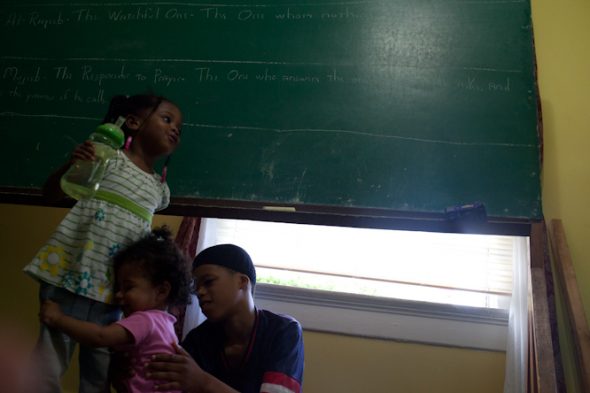
Horsing around while waiting for break fast.
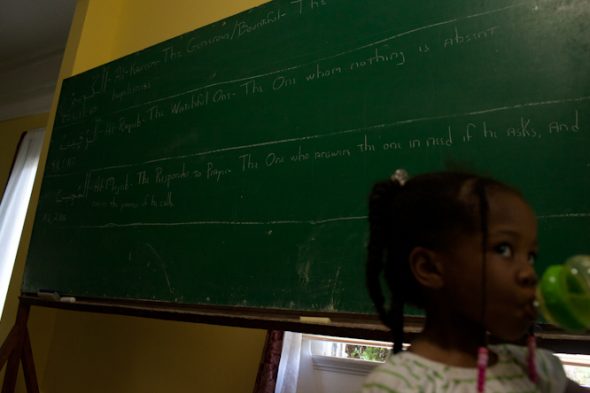
Attributes of God are described on the chalkboard.
I asked Karima after over 43 years of marriage, what is it that she loves about Imam Jamil.
“He always has had the thought pattern “As long as I can make my five, I’m going to be ok,” she said. “He represents commitment to the degree you can’t even put a label on and that’s why I’ve been with him since I first met him in 1967.”
Category:
Share it:
Comments Off on VIDEO: Day 18 – Islamic Society of Niagara Falls – 6768 Lyons Creek Road
Category:
Share it:
Comments Off on 30Mosques.com | THE FIRST FIFTEEN DAYS IN PHOTOS
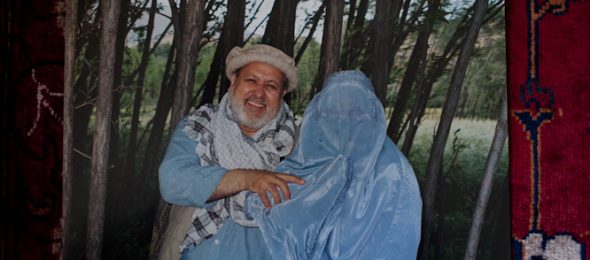
By Bassam Tariq
I am typing this in Atlanta as Aman sleeps and I am running on less than two hours of sleep. We have travelled across America in the past 15 days and we are only half way through our trip. This calls for a look back at some of our favorite moments and also an opportunity to share some great photos that didn’t make the cut for the blog posts.
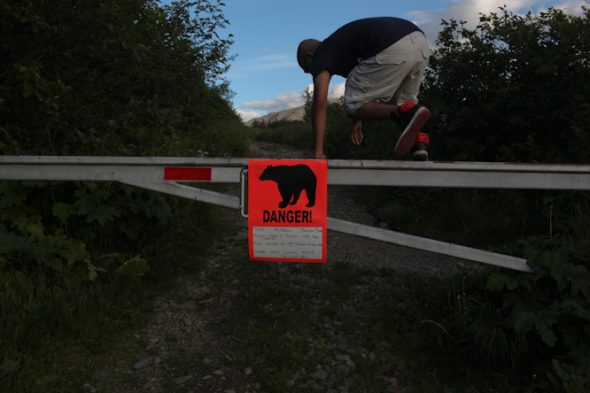
Day 0 – Anchorage, Alaska: Aman jumps a barricaded section of a park. The sign reads that a hiker was attacked by a bear earlier that morning.
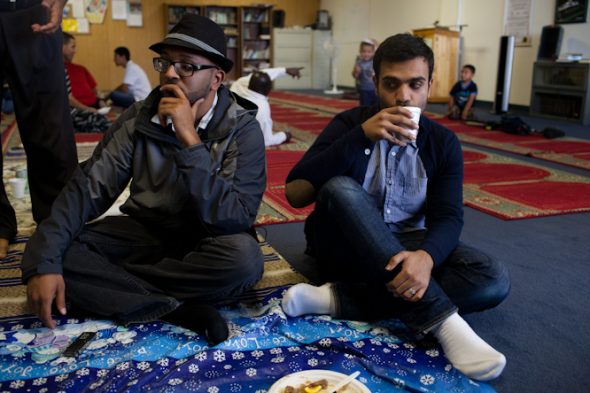
Day 1 – Anchorage, Alaska: Bassam (me) breaks fast with water while Aman waits patiently to break his fast following local time.
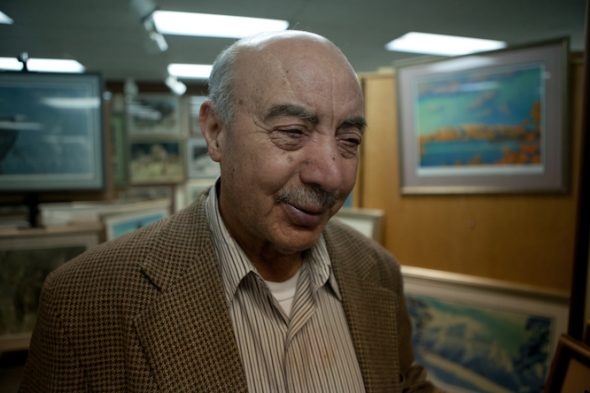
Day 1 – Anchorage, Alaska: Mohammad Obeidi somehow ended up as a cab driver in Anchorage in the early 1960’s. He also sold paintings on the side. He now is one of the largest art collectors and art buyers of local Alaskan artists.
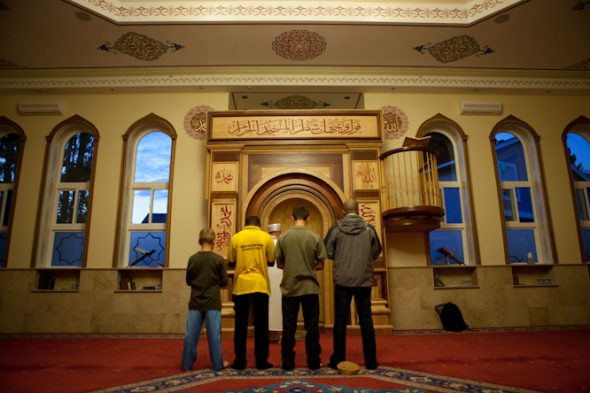
Day 2 – Seattle, Washington: Aman prays Maghrib (the sunset prayer) with a small congregation at a Bosnian mosque.
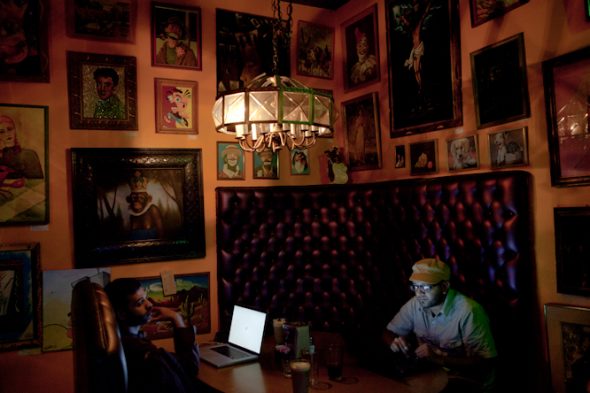
Day 2 – Seattle, Washington: Aman and I blog our second day posts sitting at a coffee shop turned bar after midnight.
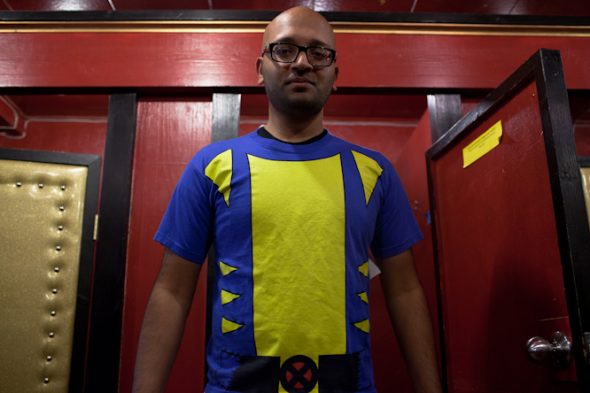
Day 3 – Portland, Oregaon: Aman relives his childhood dreams of becoming Wolverine at an uber-hip vintage store in the mecca of hipsters, Portland.
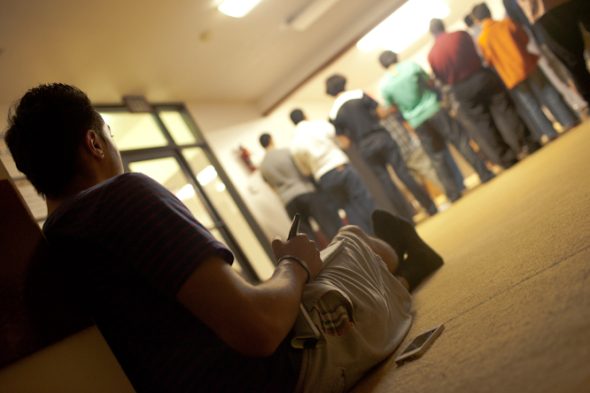
Day 3 – Corvallis, Washington Oregon: Ali Godil watches the congregation pray taraweeh, the night prayer during Ramadan, as he writes a note to MoMo, a friend who tried to bomb a Christmas tree in Portland.
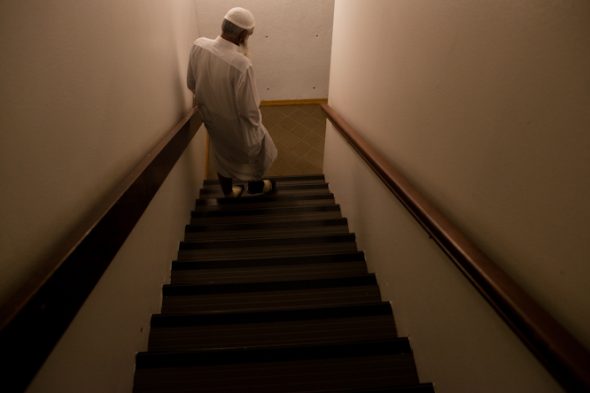
Day 3 – Corvallis, Washington Oregon: An uncle from the mosque takes his time going down the stairs.
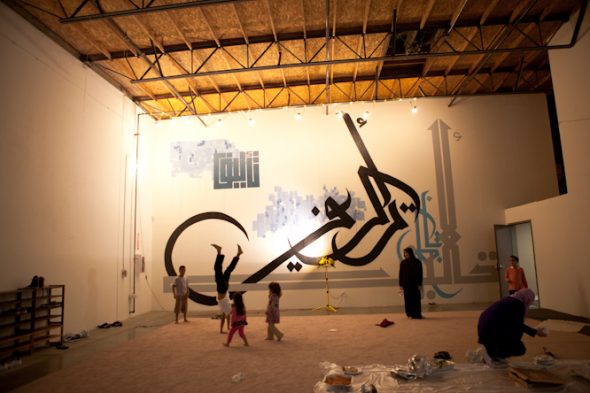
Day 4 – Freemont, California: Kids do handstand outside of the Ta’leef Collective’s main room.
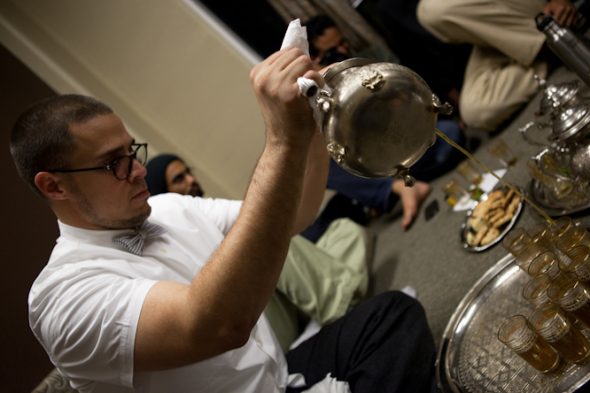
Day 4 – Freemont, California: Usama Canon, co-founder of Ta’leef Collective, pours a special blend of Moroccan tea with love.
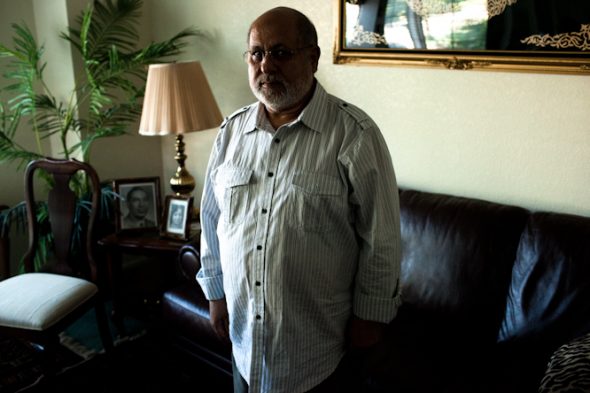
Day 6 – Las Vegas, Nevada: Amanullah poses for a picture after taking us through his journey from Afghanistan to America via photos.
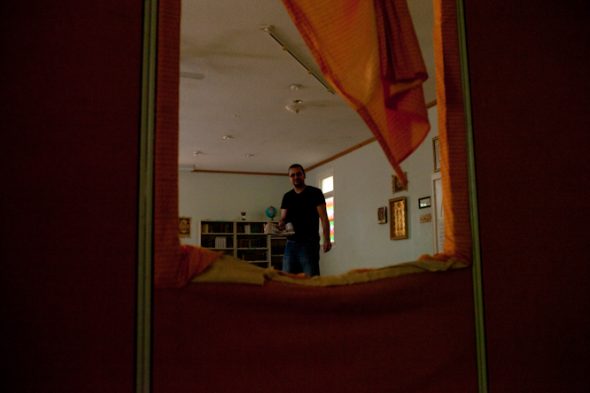
Day 7 – Laramie, Wyoming: Imad, a Libyan graduate student, leaves a generous break fast meal for us and runs back to his house to break fast with his wife and daughter.
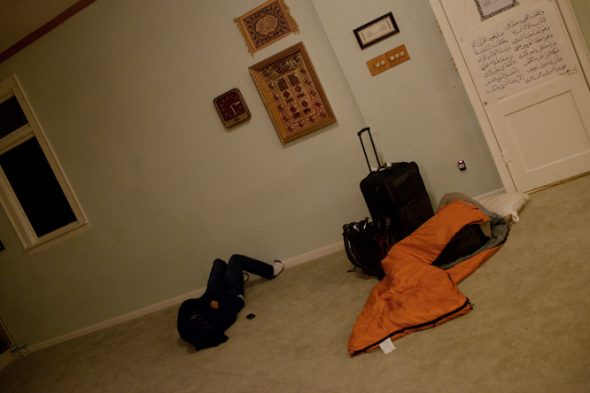
Day 7 – Laramie, Wyoming: Aman and a Jake Gyllenhaal look a like sleep in an empty mosque.
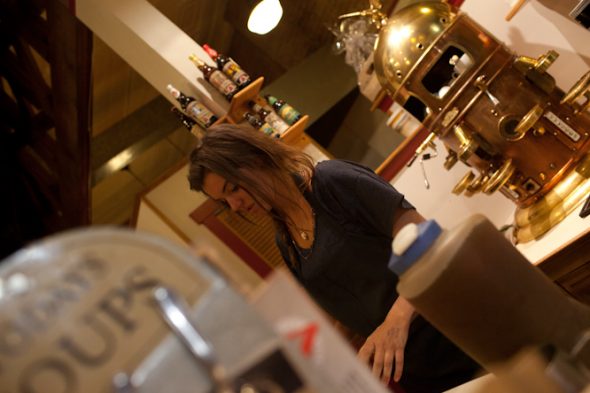
Day 7 – Laramie, Wyoming: The lone coffee shop open in Laramie til 11PM.
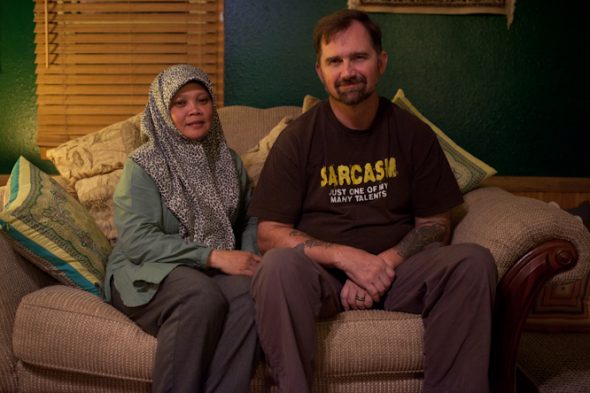
Day 8 – Sioux Falls, South Dakota: Nor and David sit together on their couch after sharing their letters written during David’s time in prison.
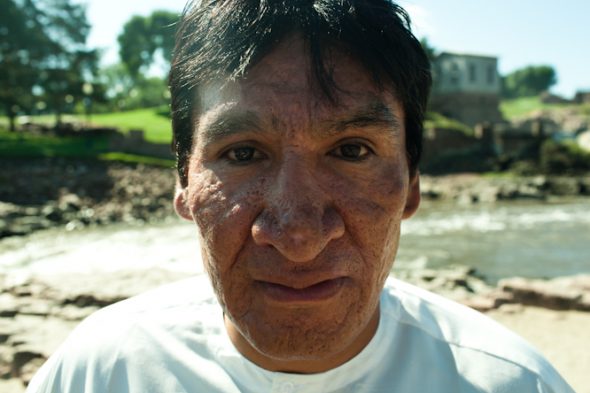
Day 8 – Sioux Falls, South Dakota: Basheer Butcher is a full-blooded Native American that converted to Islam in 2001. He hails from the Sioux tribe and grew up on the Cheyenne River Reservation in South Dakota.
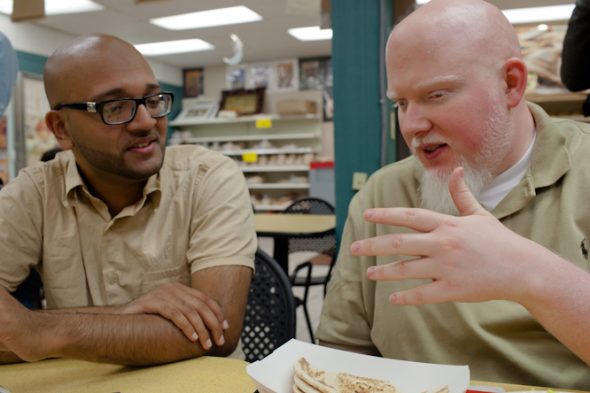
Day 9 – Minneapolis, Minnesota: Brother Ali shares a story with Aman over a break fast meal.
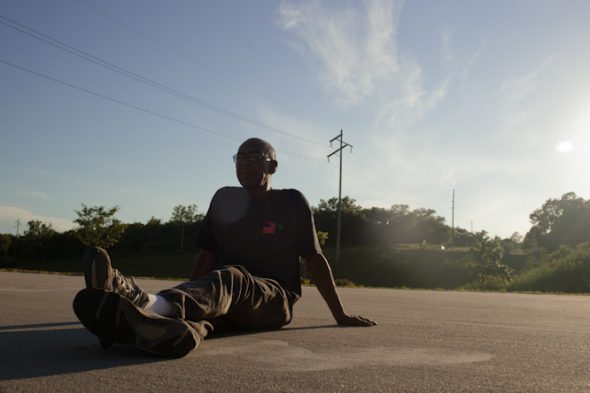
Day 10 – Omaha, Nebraska: Marshall Taylor sits on the concrete that once was Malcolm X’s birth home. Marshall and a close group of his friends have created a foundation that is working to create a cultural center in Omaha in his honor.
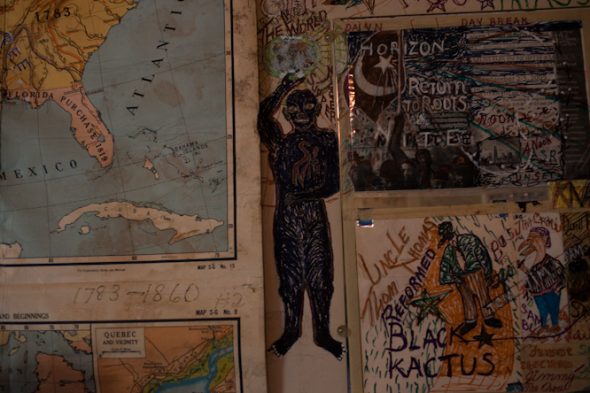
Day 10 – Omaha, Nebraska: The entire upstairs of Lutfullah’s house is covered in vulgar scribbles and cryptic drawings that he has been making for the past five years.
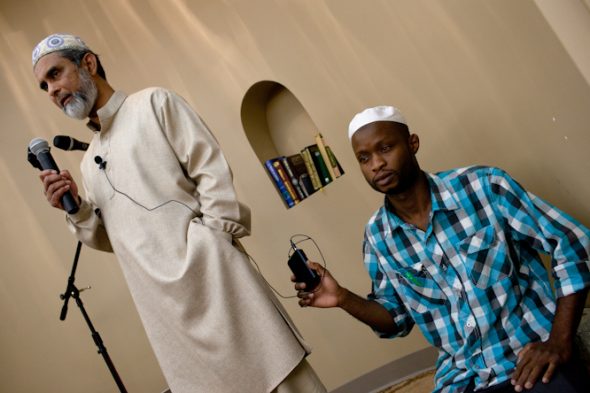
Day 10 – Omaha, Nebraska: Dr. Zia-ul Huq, an important figure of the Islamic Center of Omaha, makes an announcement about 30 mosques. A meta moment.
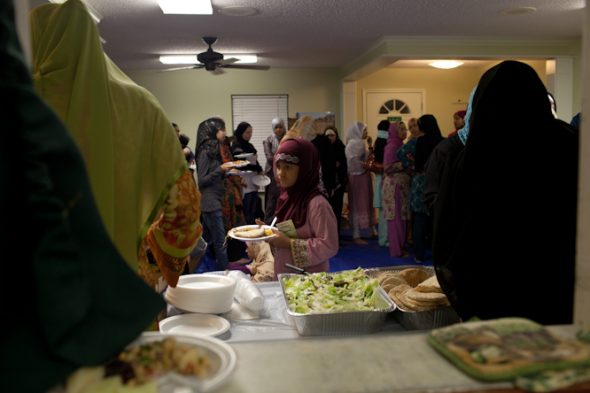
Day 13 – Little Rock, Arkansas: A little girl stands in a long line for foodthat winds across the Women’s area.
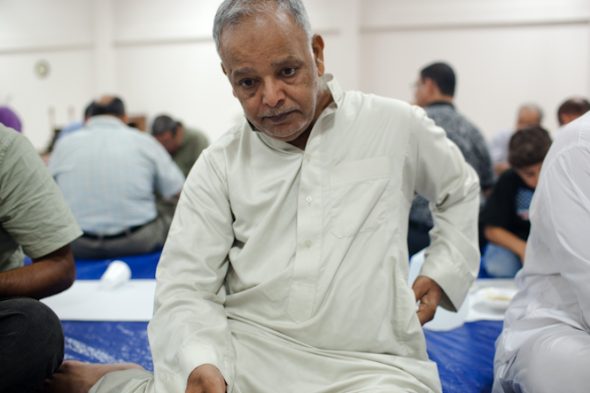
Day 15 – New Orleans, Louisiana: Syeed Ali, Aman’s father, sits along other Muslims as they break their fast.
Category:
Tagged with:
Share it:
Lights are off inside the Albanian Muslim Society of Toronto at 564 Annette Street at Runnymede Road.
One minute before Maghrib.
And no one is home…
Category:
Tagged with:
Share it: